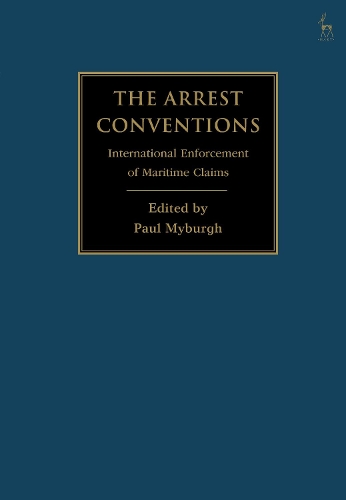
The Arrest Conventions: International Enforcement of Maritime Claims
(Hardback)
Publishing Details
The Arrest Conventions: International Enforcement of Maritime Claims
By (Author) Paul Myburgh
Bloomsbury Publishing PLC
Hart Publishing
25th July 2019
United Kingdom
Classifications
Professional and Scholarly
Non Fiction
Public international law: economic and trade
343.0965
Physical Properties
Hardback
392
Width 176mm, Height 248mm, Spine 28mm
820g
Description
The Arrest Conventions, signed in 1952 and 1999, play a fundamental role in the worldwide enforcement of maritime claims. Arrest of ships is one of the most distinctive features of international maritime law. It provides a powerful, efficient and effective means of enforcing maritime claims in rem, obtaining sufficient asset security and preserving property pending substantive proceedings. Ship arrest is, however, also a draconian power that cuts across property rights and can cause considerable commercial harm to shipowning interests. This book provides thematic and comparative analysis from leading international commentators on the most significant legal and policy issues, including practical problems arising from the Arrest Convention texts, as well as the direct implementation or indirect translation of the Arrest Conventions into domestic legal systems. It critically analyses the political and historical development of the Conventions, explores the key concepts underpinning the Arrest Convention frameworks and considers the future of ship arrest.
Reviews
[T]his book is a welcome and valuable addition to the few texts which must always be consulted when an issue relating to ship arrest falls to be argued and resolved ... From my perspective as judge of Admiralty matters, I am sure that as and when issues concerning the right to arrest arise for decision, this book will not only be an essential reference point but will also be a source of valuable ideas as to the desired direction of travel. -- Mr Justice Teare * Journal of International Maritime Law *
There is something here for everybody; moreover, the arguments advanced are overwhelmingly of a uniformly high standard, carefully constructed and well-expressed ... In short, this is an extremely worthwhile book. It is thoroughly recommended to any shipping lawyer, especially a parochial English one, who wishes to broaden their knowledge while sharing a highly enjoyable read, and to any comparative lawyer wishing to expand their knowledge of an otherwise esoteric branch of the law. Buy it while you can. Then tell your library to do likewise. -- Andrew Tettenborn, Swansea University * Cambridge Law Journal *
Author Bio
Paul Myburgh is an Associate Professor and the Deputy Director of the Centre for Maritime Law at the National University of Singapore
